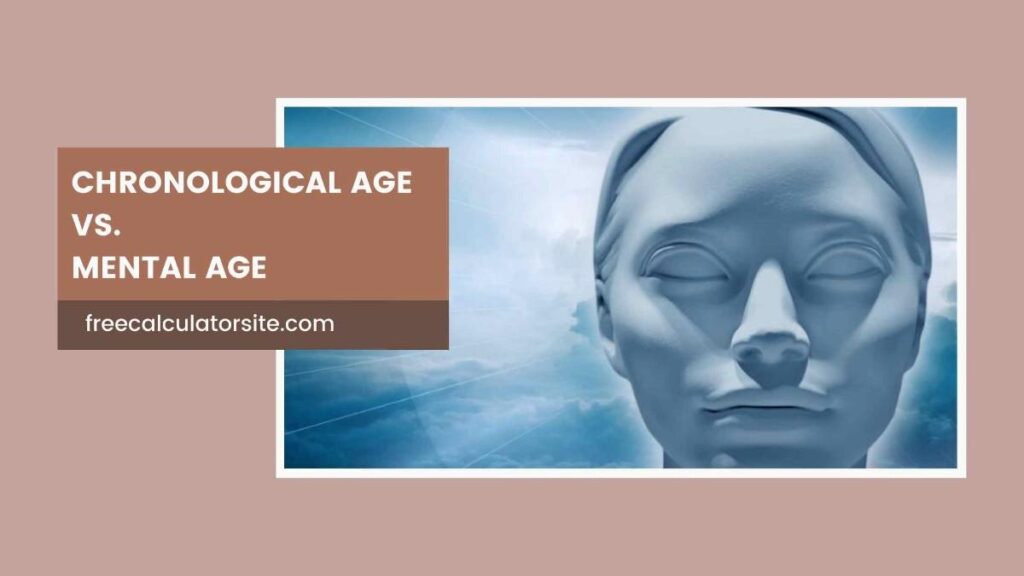Last updated on September 22nd, 2024 at 09:52 pm

Human development is a complex and multifaceted journey, shaped by physical, intellectual, emotional, and social factors.
When it comes to understanding how individuals grow and mature, two key concepts often come into play: chronological age and mental age.
Although both are expressed in numerical terms, they differ significantly in what they measure and how they reflect an individual’s abilities.
This distinction is essential in education, psychology, and even everyday life, as it challenges how we perceive intelligence, learning, and maturity.
What is Chronological Age?
Chronological age is perhaps the most straightforward way to define a person’s age.
It simply refers to the number of years, months, and days since an individual was born.
This metric is used in many aspects of life, from determining when a person can legally drive or vote to deciding when a child is ready to enter school.
In the education system, students are often grouped by their chronological age, which is assumed to correspond with their intellectual development.
For example, a child who is seven years old is placed in second grade, while a 14-year-old is likely in middle school.
Chronological age serves as a convenient way to organize people within society, but it is not always a true reflection of an individual’s intellectual abilities or emotional maturity.
What is Mental Age?
Mental age, on the other hand, refers to an individual’s cognitive abilities and intellectual development in relation to others.
Mental age is often assessed through psychological tests that measure reasoning, problem-solving skills, memory, and comprehension.
If a child’s cognitive abilities are comparable to the average 10-year-old, but the child is only 8 years old chronologically, that child is said to have a mental age of 10.
In essence, mental age gives insight into how advanced or delayed a person’s intellectual development is compared to the standard for their chronological age.
This concept is particularly useful in diagnosing learning disabilities or giftedness, as it can reveal a gap between a child’s intellectual potential and their actual achievements.
The Interplay Between Chronological and Mental Age
While chronological and mental age are distinct, they are often intertwined in practice.
Society tends to expect that chronological age will naturally correspond with mental age, particularly in educational settings.
Schools often assume that children of the same chronological age should perform similarly in academics and cognitive tasks.
However, this assumption overlooks the reality that children develop at different rates, and mental age can vary significantly from one child to another.
For instance, a 9-year-old may have the emotional maturity and cognitive skills of a 12-year-old, excelling in tasks that require advanced reasoning and abstract thinking.
Conversely, a child of the same age might struggle with basic academic concepts, reflecting a lower mental age.
These differences are often invisible in the traditional educational system, which is built around chronological age milestones.
Also Read: Chronological Age vs. Gestational Age
Limitations of Using Chronological Age as a Benchmark
One of the main issues with relying solely on chronological age to assess a person’s abilities is that it ignores individual differences in development.
Each child has unique strengths, weaknesses, and learning styles.
By grouping students by their chronological age, the educational system often places undue pressure on children who may not be developmentally ready for certain tasks.
For example, a child with a lower mental age may feel overwhelmed in a classroom designed for students of their chronological age, leading to frustration and disengagement.
Similarly, students with a higher mental age may find themselves unchallenged, becoming bored or disinterested in school.
These children may have the capacity to engage in more complex material, but the school system’s rigid reliance on chronological age keeps them confined to an inappropriate level of academic content.
Mental Age as a Tool for Personalized Learning
Understanding a child’s mental age can offer valuable insights for personalized learning.
By recognizing that children develop intellectually at different rates, educators and parents can tailor educational experiences to better suit the individual needs of each child.
For example, a child with a higher mental age might benefit from more advanced courses or independent projects, while a child with a lower mental age might require additional support, tutoring, or a different approach to learning.
This shift toward recognizing mental age can lead to more inclusive and effective education systems.
Rather than treating all children of the same chronological age as though they have identical intellectual capabilities, schools can focus on fostering each student’s strengths while addressing areas of weakness.
Such an approach promotes a deeper understanding of learning and development, ensuring that children are not left behind or held back due to rigid age-based standards.
Also Read: Chronological Age vs. Developmental Age
Measuring Mental Age: A Window into Cognitive Development
Psychological tests are often used to determine a person’s mental age.
These tests include problem-solving tasks, pattern recognition, memory assessments, and logical reasoning exercises.
The results offer insights into the individual’s cognitive strengths and challenges, helping to identify areas where the child may need additional support or could benefit from more advanced material.
However, it’s important to note that mental age is not a fixed trait.
Cognitive abilities can improve or decline over time, influenced by various factors such as education, environment, health, and life experiences.
For instance, a child’s mental age may improve with specialized teaching methods that focus on critical thinking or problem-solving, showing that mental age is dynamic and can be nurtured through targeted interventions.
Chronological Age vs. Mental Age in Adulthood
While the concepts of chronological and mental age are often discussed in relation to children, they are equally relevant for adults.
As people age, their cognitive abilities may not always align with their chronological age.
Some older adults may retain sharp mental faculties well into their senior years, showing a mental age that is much younger than their chronological age would suggest.
Conversely, cognitive decline due to conditions like dementia can result in a mental age that is significantly lower than one’s chronological age.
In the workplace, this mismatch between chronological and mental age can also become evident.
Some employees may have the innovative thinking and problem-solving abilities of individuals much younger than their chronological age, while others may struggle to keep pace with the demands of modern work environments due to cognitive limitations.
Moving Beyond Chronological Age
As society continues to evolve, it is becoming increasingly clear that chronological age alone is an inadequate measure of a person’s potential or abilities.
By embracing the concept of mental age, we can create more inclusive environments in schools, workplaces, and communities, where people are evaluated based on their true cognitive abilities rather than their birthdate.
The goal should be to nurture each individual’s intellectual development, recognizing that growth happens at different rates for different people.
Whether in childhood or adulthood, understanding the balance between chronological and mental age can lead to a more supportive and effective approach to learning and personal development.
In conclusion, while chronological age is a convenient marker of time, it is mental age that provides a deeper understanding of an individual’s intellectual capabilities.
By focusing on mental age, we can foster a more personalized, inclusive, and dynamic approach to education and personal growth, ensuring that every individual can realize their full potential.

Akash Singh is a finance enthusiast who shares valuable insights on various calculators.
